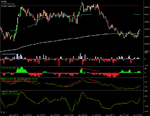jon1971
Well-known member
- Messages
- 495
- Likes
- 28
Jon - if S/R is a fundamentally flawed concept, then it doesn't matter what you add to it, a bit like building a house on sand. S/R is just an example. So if you aren't trading purely on S/R but are including it in your toolbox, then the system would still be flawed.
I would be more than happy to discuss another aspect of TA and why TA proponents think it should work. The problem is no-one seems to want to make a case in favour of any part of textbook TA, other that saying "it just works".
I have shown a case where S/R could work (albeit short term) and cases where it should be treated with suspicion.
In the spirit of having a reasoned debate can't anyone come up with solid reasons for all this stuff to work ?
DT, it's not fundamentally flawed, not sure how you've read that. what I'm saying is that it is of limited value, if used on it's own, in isolation.
Why does TA work? A very puerile explanation (and as I said to Mike yesterday, this is not my forté), would be because the market has a memory. And because what moves price? Conviction, which is fuelled by three things and three things ONLY, fear, greed and uncertainty. What we're measuring and seeing on price charts is human emotion, the only TRUE driver of price. How many times has a news item come out and the market has done the exact opposite of what you expected it to. The market is cyclical and these cycles are quantifiable. We can get into the whole Efficient Market Hypothesis thing if you want, but I'd really rather not.
Let me ask you something, why can't TA complement a predominantly FA based approach and why can't FA complement a predominantly TA based approach? What's all the "YOU'VE GOT TO BE IN ONE CAMP OR THE OTHER" nonsense all about?
To be honest mate, whilst I find the whole TA vs. FA debate a whole heap of fun, it's been raging for years and will rage for many more. What I actually came on here to try and discuss was the concept of viewing the market from a "probabilistic" perspective as opposed to one of "expectancy", I seem to have gotten majorly side-tracked, if you could help me out with that, I'll buy you a cyber pint. (sorry that's cyber, not cider😕 )...

